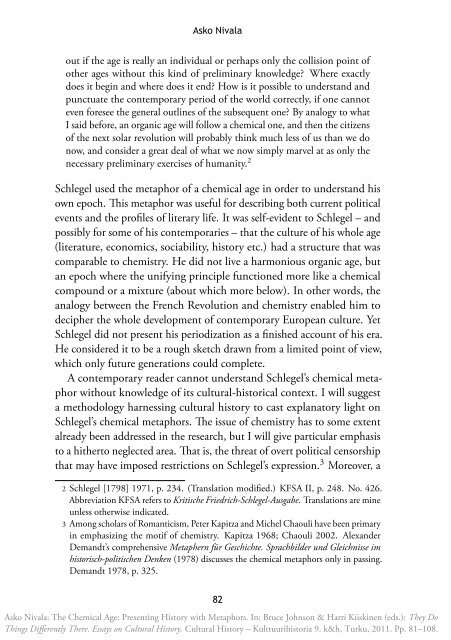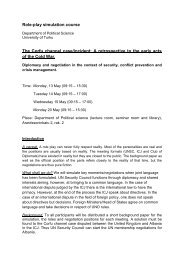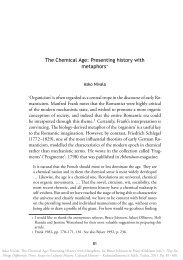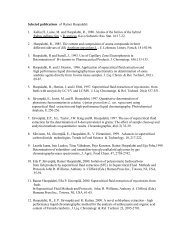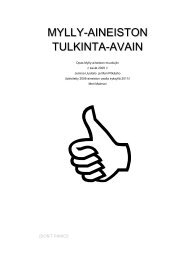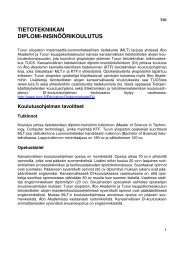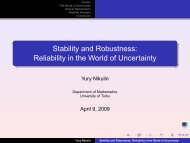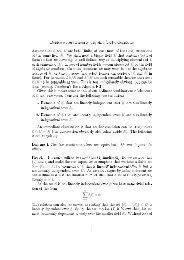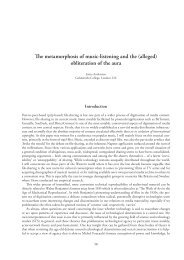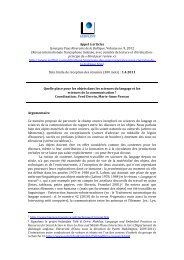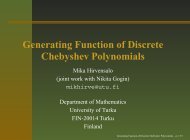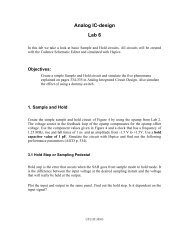The Chemical Age: Presenting history with metaphors∗
The Chemical Age: Presenting history with metaphors∗
The Chemical Age: Presenting history with metaphors∗
You also want an ePaper? Increase the reach of your titles
YUMPU automatically turns print PDFs into web optimized ePapers that Google loves.
Asko Nivalaout if the age is really an individual or perhaps only the collision point ofother ages <strong>with</strong>out this kind of preliminary knowledge? Where exactlydoes it begin and where does it end? How is it possible to understand andpunctuate the contemporary period of the world correctly, if one cannoteven foresee the general outlines of the subsequent one? By analogy to whatI said before, an organic age will follow a chemical one, and then the citizensof the next solar revolution will probably think much less of us than we donow, and consider a great deal of what we now simply marvel at as only thenecessary preliminary exercises of humanity. 2Schlegel used the metaphor of a chemical age in order to understand hisown epoch. This metaphor was useful for describing both current politicalevents and the profiles of literary life. It was self-evident to Schlegel – andpossibly for some of his contemporaries – that the culture of his whole age(literature, economics, sociability, <strong>history</strong> etc.) had a structure that wascomparable to chemistry. He did not live a harmonious organic age, butan epoch where the unifying principle functioned more like a chemicalcompound or a mixture (about which more below). In other words, theanalogy between the French Revolution and chemistry enabled him todecipher the whole development of contemporary European culture. YetSchlegel did not present his periodization as a finished account of his era.He considered it to be a rough sketch drawn from a limited point of view,which only future generations could complete.A contemporary reader cannot understand Schlegel’s chemical metaphor<strong>with</strong>out knowledge of its cultural-historical context. I will suggesta methodology harnessing cultural <strong>history</strong> to cast explanatory light onSchlegel’s chemical metaphors. <strong>The</strong> issue of chemistry has to some extentalready been addressed in the research, but I will give particular emphasisto a hitherto neglected area. That is, the threat of overt political censorshipthat may have imposed restrictions on Schlegel’s expression. 3 Moreover, a2 Schlegel [1798] 1971, p. 234. (Translation modified.) KFSA II, p. 248. No. 426.Abbreviation KFSA refers to Kritische Friedrich-Schlegel-Ausgabe. Translations are mineunless otherwise indicated.3 Among scholars of Romanticism, Peter Kapitza and Michel Chaouli have been primaryin emphasizing the motif of chemistry. Kapitza 1968; Chaouli 2002. AlexanderDemandt’s comprehensive Metaphern für Geschichte. Sprachbilder und Gleichnisse imhistorisch-politischen Denken (1978) discusses the chemical metaphors only in passing.Demandt 1978, p. 325.82Asko Nivala: <strong>The</strong> <strong>Chemical</strong> <strong>Age</strong>: <strong>Presenting</strong> History <strong>with</strong> Metaphors. In: Bruce Johnson & Harri Kiiskinen (eds.): <strong>The</strong>y DoThings Differently <strong>The</strong>re. Essays on Cultural History. Cultural History – Kulttuurihistoria 9. k&h, Turku, 2011. Pp. 81–108.


